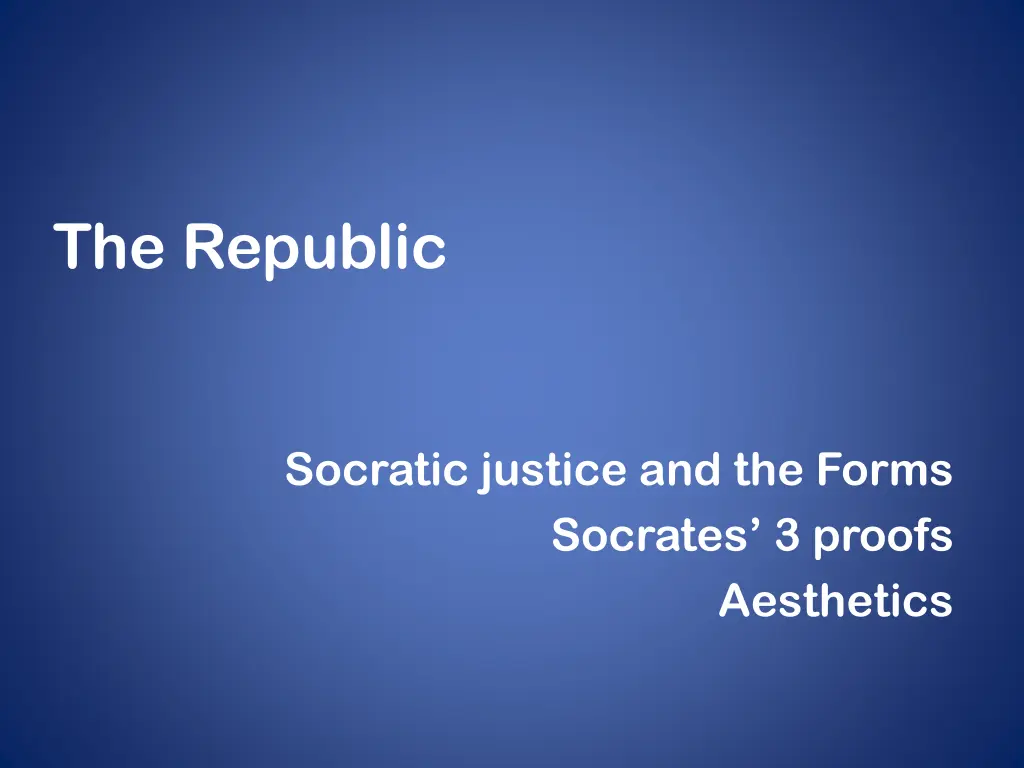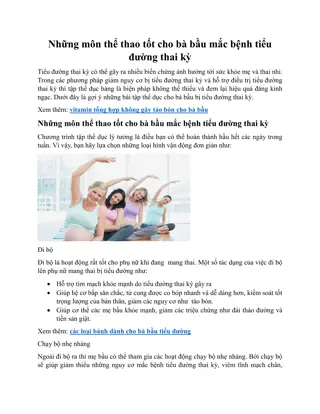
Socrates' Analysis: Justice, Forms, and Reason
Explore Socrates' philosophical journey in "The Republic," from linking justice to psychic harmony to discussing the Forms and the role of reason. Discover how Socrates argues for the intrinsic value of justice and its connection to leading a happy life through his exploration of the psyche's desires and the Form of the Good.
Download Presentation

Please find below an Image/Link to download the presentation.
The content on the website is provided AS IS for your information and personal use only. It may not be sold, licensed, or shared on other websites without obtaining consent from the author. If you encounter any issues during the download, it is possible that the publisher has removed the file from their server.
You are allowed to download the files provided on this website for personal or commercial use, subject to the condition that they are used lawfully. All files are the property of their respective owners.
The content on the website is provided AS IS for your information and personal use only. It may not be sold, licensed, or shared on other websites without obtaining consent from the author.
E N D
Presentation Transcript
The Republic Socratic justice and the Forms Socrates 3 proofs Aesthetics
Answering the challenge 1. Prove that it pays to be just (i.e. that justice is good in itself and not just for its consequences) 2. Prove that the just life is a happy life
Answering the challenge Socrates has to link his definition of justice (= psychic harmony) to show that someone wouldn t behave unjustly in the conventional sense (e.g. stealing, cheating, raping, embezzling etc.). Cf. 442-443: Socrates is aware of this.
Answering the challenge Socrates doesn t connect his definition of justice to these unjust actions in Book 4. In Book 4, he establishes that justice = psychic health. For this to be possible, reason needs to be in control. In Books 5-6, he discusses the Forms (474- 518). In Book 9 he discusses the different kinds of state and soul (581-595). The different kinds of life they live.
The desires of each part of the psyche Each part of the psyche has its own object of desire: Reason loves truth and reality The thumos desires success and victory and praise The appetites desire food, drink, sex, money and the things needed to provide for those material desires
More reality EPISTEMOLOGICAL EPISTEMOLOGICAL ONTOLOGICAL ONTOLOGICAL Understanding Forms Thinking Objects of maths/geometry Believing Phenomenal objects Imagining Images/shadows Less reality
The sun Just as the sun makes everything in this world visible, so the Form of the Good makes everything in the intelligible world knowable. The sun doesn t just make things visible, it also makes them grow; the Form of the Good doesn t just explain things, it also, in some way, seems to create them. In some way, it brings them into being.
Summarising Socrates argument Move Move from psychology to metaphysics: from psychology to metaphysics: Has to prove the relation between reason and the good. Move Move from metaphysics to ethics: from metaphysics to ethics: The just man (whose psyche is controlled by reason) acts justly because reason aims at the good.
Socrates 3 proofs 1st 1st proof (576b proof (576b- -580c): Cities and individuals become more unhappy as they become unjust This is based on the idea of the integrated psyche (directed by the rational part) If you have an integrated psyche, this is also a healthy psyche, and we would want this as much as we would want bodily health 580c):
Socrates 3 proofs 2nd 2nd proof: proof: 580d Depending on which part of the psyche dominates the others, this leads to three different kinds of life. Which type of life is the most pleasant? To judge this, we must turn to those who have experienced all three (the philosopher-rulers) The philosopher is Socrates example of the just man (if you want to be truly just, you must have knowledge) How just can the rest of us be? Focus here is on pleasures. Pleasures are subjective, but judgements about the pleasantness of life are not subjective 580d- -583a: 583a:
Socrates 3 proofs 3rd 3rd proof: proof: 583b Relies on distinguishing between genuine pleasures and the mere relief of pain. Genuine pleasures are positively valuable, whereas the mere relief of pain involves only the elimination of something not valuable. Genuine pleasure is best secured by those who turn their attention away from their own desires and focus on sources of pure pleasure (e.g. beauty and truth). The person best able to do this is a person who rules his or her choices by reason. 583b- -588a: 588a:
Summarising Socrates argument Move Move from psychology to metaphysics: from psychology to metaphysics: Has to prove the relation between reason and the good. Move Move from metaphysics to ethics: from metaphysics to ethics: The just man (whose psyche is controlled by reason) acts justly because reason aims at the good. Final step: the just man is also the happiest Final step: the just man is also the happiest Book 4: reason has to control the desires. Book 9: each part of the psyche has its own desires; the rational desire for wisdom is the greatest desire.
Socrates theory of art Art in Books 2 and 3: Art in Books 2 and 3: Considered to be dangerous Art arises out of an irrational part of the psyche and appeals and nurtures that irrational part of the psyche Art Art in Book 10: in Book 10: Art is still considered to be dangerous, but it is also useless Art is a copy of the phenomenal world, which in turn is a copy of the Forms Socrates: there is an old quarrel between philosophy and poetry (607b). Hence, we must abandon poetry for the sake of philosophy. Cf. Aristotle: watching dangerous emotions on the stage helps purge us of these urges.
Controlling thumos The control of the arts is the control of the passions. The challenge facing every moralist: justice is only possible when the passions are controlled. Adeimantus: how can we protect ourselves against the passion for injustice? (Book 2) Socrates: the most powerful passion is thumos. It can lead to greatness and to tyrants. The question is how to channel thumos into the service of the public good.






















